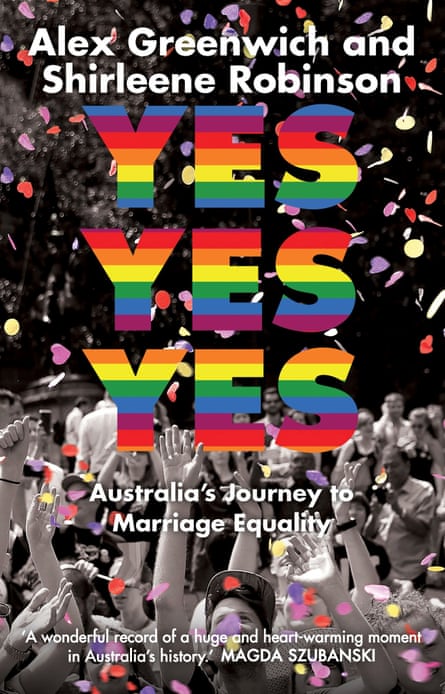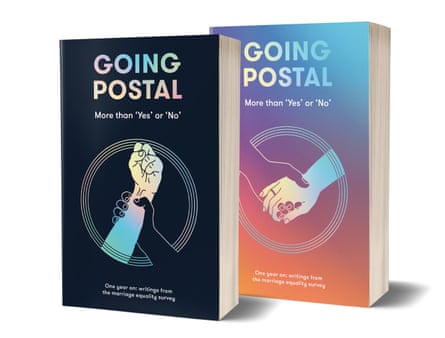The long march to marriage equality in Australia via 2017’s voluntary national postal survey had so many twists and turns that a flowchart explaining the tortured process has earned a Walkley award nomination.
There was time enough in the saga for the roadblocks thrown up by unexpected opponents such as Julia Gillard, and the promises of would-be but never-were heroes such as Malcolm Turnbull, to be forgotten.
Thankfully we have two new books to guide us: Yes Yes Yes: Australia’s Journey to Marriage Equality, which catalogues the long journey to victory and takes us behind the scenes in the critical moments, and Going Postal: More than Yes or No, which showcases what it felt like to be subjected to – or excluded from – that process.
In Yes Yes Yes, Australian Marriage Equality’s co-chair, Alex Greenwich, and its national spokeswoman, Shirleene Robinson, take us back to the early days of the marriage equality movement, which was galvanised by the Howard government’s decision to outlaw same-sex marriage in 2004.
Through defeated early bills and the Labor national conference’s decision to allow its MPs a conscience vote in 2011, the book describes a political process characterised at every juncture by two steps forward, one step back.
Society must change before laws can, and Greenwich and Robinson introduce us to the activists who persuaded a majority of Australians to support same-sex marriage in polls, a decade before it was finally delivered.
In terms of revelations, we get a clear picture of Gillard’s opposition: Bob Brown tells the authors the then-prime minister refused to allow marriage equality to become a condition of Greens support when she formed minority government in 2010.

Greenwich, meanwhile, recalls being lobbied in 2011 by someone “believed to be close” to Gillard discouraging marriage equality campaigners Australian Marriage Equality and GetUp from bidding for a charity auction for dinner with Gillard, for fear it would “embarrass” her. They won, but Gillard delayed, and it took more than six months for three gay couples to dine with her.
There are understandable flashes of frustration from the authors at the hurdles they and other activists had to overcome. Greenwich recalls privately declaring “we’ve been fucked” by Tony Abbott’s conclusion that the party room was in favour of a plebiscite in August 2015, and he describes Liberal senator James Paterson’s intervention to promise a more conservative same-sex marriage bill days before the postal survey result as “the ultimate act of political bastardry”.
The authors give nods to parliamentarians and allies in both parties, particularly Penny Wong and the five Rainbow Rebels in the Liberal party – but when it comes to the crunch of campaigning they credit “the Labor party, the trade union movement, the Greens, [and] members of Libs and Nats for YES” for stepping up, acutely aware that progressive parties and liberal dissidents had to overcome an obstacle put in their way by a conservative Liberal-National government.
In 2008 Turnbull towed the Liberal line against marriage equality, but in 2011, according to the book, he apparently told Greenwich he would consider crossing the floor to pass the law if his vote were necessary.
After that flicker of promise, Turnbull hardly features except for a brief cameo in a private airport hanger imploring Greenwich and other advocates to help overcome Senate opposition to the plebiscite.
After the postal survey recorded a 61.6% yes vote the authors note that Turnbull’s contribution to parliamentary debate was “less impressive” than others, honing in on his line that same-sex couples were better off married than “living alone comforted only by their respective cats”. Magda Szubanski and Alan Jones, meanwhile, are quoted rejecting the view that Turnbull deserves credit for the eventual passage of marriage equality.
Enter the real heroes of the story: local campaigners. Yes Yes Yes introduces us to characters such as Dawn Hawkins, who campaigned for marriage equality on the New South Wales south coast: from Kiama through Moruya, south to Bega, Merimbula and Eden.
When Hawkins reached Cobargo in the Bega Valley, she was shocked to find a town already covered in rainbow flags. Two gay men who ran the local Australia Post had suffered a complaint when they raised a rainbow flag, so the community posted rainbows in solidarity.
And that is the whole marriage law postal survey campaign in miniature: activists forced to go to extraordinary lengths to get out the vote, and who found the community already broadly supportive – because LGBT Australians were themselves the best argument for change.
Yes Yes Yes steers clear of triumphalism, and the pain of many in the LGBT community is represented – but it’s tightly focused on the issue of marriage equality and the memoir of two of its most significant campaigners, with little discussion of queer rights in the broad.
If you want to zoom out and take the broadest possible view, Going Postal: More than Yes or No offers a multitude of queer perspectives on the postal survey, mostly written before the result was announced.

Edited by Quinn Eades and Son Vivienne, it’s a diverse collection that encapsulates every form of discontent about the survey, from poetry, cartoons, blogs and social media posts to essays and personal reflections. The aim, they say, is “to amplify some of the voices that were less audible” during the campaign to produce a result that is “disagreeable and hopefully discordant”.
As Simon Hunt (aka political satirist Pauline Pantsdown) says in the foreword: Indigenous Australians, refugees, Muslims and people of colour face scrutiny every day that lead many writers in the collection to question “the narrow focus of the YES campaign”.
This text should not be dismissed as a grab-bag of grievances from other progressives or disadvantaged minorities without connection to the marriage campaign, but rather an attempt to situate that one fight within the broader sweep of the project of equality and human rights in Australia.
When so much energy was expended by queer Australians on one cause, it’s refreshing to read Nayuka Gorrie declare that “marriage for the queers is sort of like what constitutional recognition is for the blacks … striving to live lives that resemble heterosexual ‘normality’ just as assimilation is striving to whiteness”.
Queer Arab Muslim poet Omar J. Sakr shares his cousin’s reaction, when Vote No skywriting prompted a conversation in which Sakr identified himself as bisexual: “C’mon cuz, don’t say that. Tfeh.”
Sakr describes walking in two worlds but concludes that he prefers his home in multicultural western Sydney to the white conservative world “because the white conservative world could never conceive of loving me, even imperfectly”.
It’s an intersectional approach to queer liberation – filled with voices so clear and strong they counterbalance any temptation the white homosexual male might have to unfurl the “mission accomplished” banner.
Going Postal is not an unrelenting polemic against the postal survey and gay marriage. Chloe Sargeant interviews same-sex couples who want to get married, so the purpose behind the pain is always present. Simon Copland presents the survey as a chance – or a missed opportunity – to show strength.
Whether the postal survey was the crowning achievement of more than a decade’s campaigning, or a painful irrelevance, depends on the perspective of the participant. But shared history is a vital element of community, and the postal survey will be a defining event in the history of queer Australia.
